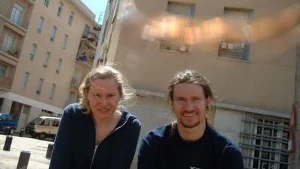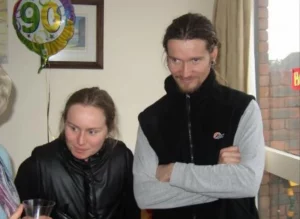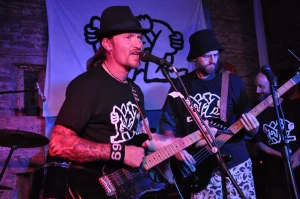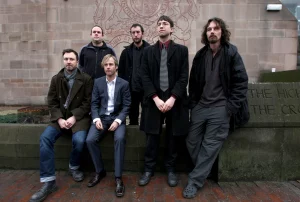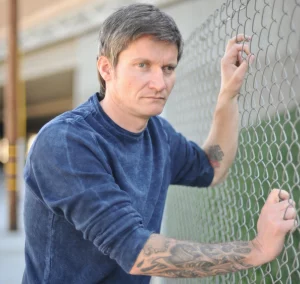by Geoff Dembicki/Vice
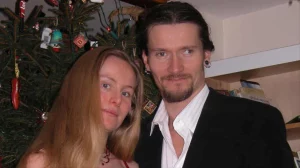
Mark Kennedy pretended to be an activist in order to have a sexual relationship with Kate Wilson. Photo: Kate Wilson
When Kate Wilson was 23, she got deceived into having sex with an older guy who wasn’t what he appeared to be. To her, he was Mark Stone, a radical environmental activist who shared her taste in country music and her belief that capitalism is destroying the planet. He wrote poetry for her, went to her grandmother’s 90th birthday party, and helped her organize a massive protest against the G-8 summit in Scotland. They lived together nearly two years as lovers and stayed close friends for years after.
But seven years after they first met, in 2010, their intimate relationship imploded when Wilson learned the shocking truth about Stone’s true identity. Not only was his real last name “Kennedy.” Not only did he have a wife and two kids. But the person with whom Wilson had “shared many of my interests and dreams,” who told her “lots of his most intimate stories and secrets,” was actually working for the British state.
In 2003, Kennedy had been sent undercover by an elite unit in London’s Metropolitan Police Service to gather intelligence on activists like Wilson. He spent seven years living a double life: He was a fearless organizer who had a shadowy backstory as a cocaine runner, but he was also a cop with a family in Ireland.
Until the day he was “outed” by a small group of sleuthing activists, Kennedy was a trusted leader in a movement that was desperately trying to wake up Britain and the world to the impending horrors of the climate emergency. But his friends, comrades, and at least 10 other women he had sex with had no idea Kennedy was selling them out to governments and corporations that had a vested interest in keeping the country hooked on fossil fuels.
This wasn’t just a personal betrayal. “He was controlling people’s ability to organize politically,” Wilson told VICE World News. “That is profoundly anti-democratic.”
Nearly 20 years after Kennedy first met Wilson and manipulated his way into her bedroom, the legal consequences are still unfolding. A judicial authority known as the Investigatory Powers Tribunal made a damning decision about Kennedy last September.
The court ruled that Kennedy “debased, degraded, and humiliated” Wilson. He “invaded the core of her private life” and “caused her mental suffering.” He “interfered” with her “sexual autonomy” and showed “a profound lack of respect” for her “bodily integrity and human dignity.” It was an “abuse of the highest order.”
The Investigatory Powers Tribunal concluded, “This is not just a case about a renegade police officer, who took advantage of his undercover deployment to indulge his sexual proclivities.” It described “disturbing and lamentable failings at the most fundamental levels.”
The ruling stated that the UK’s largest police force had adopted a “don’t ask, don’t tell” policy toward Kennedy having sex while undercover, “or more probably a lack of interest in protecting women.” It said activists such as Wilson never should have been targeted for their political beliefs.
The Metropolitan Police isn’t disputing the judgment. “We accept and recognise the gravity of all of the breaches of Ms. Wilson’s human rights as found by the tribunal,” it says in a statement provided to VICE World News. “[We] unreservedly apologise to Ms. Wilson for the damage caused, and the hurt she has suffered from the deployment of these undercover officers.”
Wilson had previously said that learning about Kennedy’s true identity “was like a computer virus. It’s corrupted all my memories of those times, and it affects all the relationships that I’ve had since.”
The court decision this fall, which was major news across much of Europe but barely noticed in the U.S. and Canada, was the result of a 10-year legal battle by Wilson. “In terms of emotional closure, it’s all quite complicated,” she said. “In the end, the judgment was a much bigger victory than I expected it to be.”
The ruling was a vindication for dozens of other women who have come forward across the UK saying they also were deceived into sexual relationships with undercover officers. The tribunal will now be deciding what damages Wilson should receive.
But Kennedy caused harm that some of Wilson’s friends and former activist colleagues say is not only personal, but actually planetary. They say that the dirty tricks he played, carried out on behalf of a police force hostile to political dissent, hobbled a climate movement whose goal was to prevent death and destruction from an overheated planet.
VICE World News spoke with more than half a dozen people closely involved with the UK climate movement who came in contact with “Mark Stone” during the 2000s. Some of them, like Wilson, are still attempting to rebuild their lives. They have been largely unable to engage in climate activism since Kennedy was exposed. And they say the shockwaves of distrust and paranoia he sent into their community destabilized a movement that was on the verge of making a huge political impact.
“Let’s roll back history a bit,” said Harry Halpin, a former climate organizer from the U.S. who said he was tracked by FBI agents after attending activist meetings with Kennedy. Halpin said there was real global momentum building behind a climate protest movement during the late 2000s. But instead of “pressuring governments with the help of scientists to stop climate change,” it largely fizzled. He holds Kennedy partly responsible.
“Let’s be very clear: Mark intentionally destroyed that process,” said Halpin, who now runs an internet privacy company that employs Chelsea Manning. “He did that by picking on key people and destroying their lives.”
Mark Kennedy often seemed to be looking in two directions at the same time. At 2 years old, he got a staple stuck in his eye while playing in a cardboard box and the injury left him with muscle damage and the ability to only focus one eye.
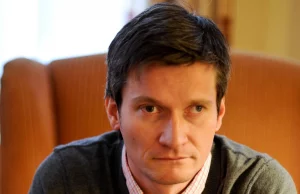
Mark Kennedy in 2011. The tribunal found he had had sex with at least 11 women while undercover. Photo by Nick Stern
He joined the Metropolitan Police in his 20s, and in 1999 he completed a course that trained officers how to go undercover to bust drug dealers. “I was a natural at undercover work and I loved it,” he later told the Daily Mail. “Drug work was black-and-white. You identify the bad guys, record and film the evidence, present it in court, and take them down. I did that for four years.”
Though Kennedy’s work doesn’t appear to have resulted in any notable cases, it caught the attention of his superiors. In 2002 he passed a series of tests that allowed him to begin working with the National Public Order Intelligence Unit, set up to monitor extremist groups that the police feared could cause public disruption and violence. In practice, many of the unit’s targets were activists working on social justice, anti-racist, and environmental campaigns. Since the 1960s, more than 144 undercover officers have spied on over 1,000 political groups, a public inquiry revealed.
Kennedy relocated to the English city of Nottingham, a three-hour drive north of London. He said he chose the last name “Stone” more or less at random because it sounded neutral. It was common practice for undercover officers with the unit to keep their first names. “It’s really important if you’re stuck in a crowd and somebody’s shouting at you to do something or calling you, you need to be able to react,” Kennedy told the British broadcaster Channel 4.
VICE World News asked Kennedy for an interview through his LinkedIn page, but he didn’t respond to the request.
His first assignment was to infiltrate a community space known as the Sumac Centre, a gathering place where activists strategized, cooked vegan food, hosted parties, and screened films. Kennedy prepared for the job by buying black clothes, piercing his ears, and letting his hair grow long, according to an account in Undercover: The True Story of Britain’s Secret Police, a book by Guardian journalists Rob Evans and Paul Lewis.
He also invented a backstory. Kennedy had always been good at climbing, so he decided he would present himself as a professional rope technician who did work on cranes and skyscrapers. This would be a convenient way to explain his frequent disappearances. To help explain his generous expense account from the police, he pretended he had previously made a lot of money smuggling cocaine from Pakistan.
Within a few months of hanging out at the Sumac Centre, Kennedy started focusing his attention on Kate Wilson, a woman in her early 20s who travelled internationally for environmental camps and conferences and knew activists across the world. She spoke several languages and had recently worked as a translator in Venezuela, at one point translating a speech by President Hugo Chávez. Kennedy piqued her interest. “He was very charismatic, exciting, good fun,” Wilson later told Evans and Lewis. “He was quite a lot older than me—nearly 10 years older. He was very romantic, and that set the tone for our relationship.”
Kennedy and Wilson were soon dating. “He frequently took [Wilson] out to dinner,” the tribunal judgment reads. “He bought her gifts. They went on day trips, weekends away, and holidays. He wrote to her in affectionate and loving terms. He wrote her poetry. He taught her to drive his van and let her use it when he was away.”
They began spending three or four nights a week together, and around May 2004 they moved into a house shared with other activists. Kennedy built Wilson “a four-poster bed out of scaffolding. They used [Wilson’s] room as a study and spare room with a futon for sleeping on. On one occasion, [Wilson’s] parents stayed in [Mark Kennedy’s] room,” the judgment reads. Kennedy used his undercover budget to buy Wilson gifts, at one point asking his deployment manager for cash to get her a used mountain bike.
As Wilson fell in love with someone she knew as Mark Stone, Kennedy the cop was filing reports about her back to his superiors. “[She] was identified by MK as an influential person in the world of activism almost at the beginning of this operation,” said an internal report cited by the Investigatory Powers Tribunal. “As such, the operation has utilised her reputation, knowledge, energy, and contacts (both national and international) to progress and promote [MK’s] own standing.”
From the beginning of their relationship, Wilson and Kennedy were organizing political events. With leaders of the world’s top eight economic powers set to meet in Scotland in 2005 for the G-8 summit, Wilson and Kennedy set to work coordinating the agenda and logistics for a massive anti-globalization protest. Thousands showed up to pressure then–Prime Minister Tony Blair, George W. Bush, and other leaders to take action on fixing climate change and global poverty.
Earlier that year, Wilson and Kennedy had ended their romantic relationship when Wilson decided to move to Barcelona. “Despite that, they remained close and affectionate,” the tribunal document reads. “MK also remained in contact with her family after the breakup.”
By then, Wilson had served the required role for Kennedy’s mission. Within the space of two years, he had gone from being a newcomer at the Sumac Centre to a trusted figure within the UK’s radical activist movement.
During the G-8 in northern Scotland, protesters set up a campsite 12 miles from Gleneagles Hotel, where the summit was taking place, to house the thousands of activists coming from all over Europe and the world. Kennedy was put in charge of logistics. He drove around the country securing portable toilets, tents, and other supplies. By some accounts, Kennedy performed his job well, which earned him the new nickname “Transport Mark.”
In addition to being useful to the movement, Kennedy could also be lots of fun to be around. “He was a nice guy, super friendly, really easy to get along with,” said Jason Kirkpatrick, a climate activist who first met Kennedy around this time, and is working on a documentary about undercover policing called Spied Upon. “He had some money, he offered to buy rounds of beer; that made him quite popular.”
For many activists at the G-8 summit, staying in the camp itself was one of the highlights. They cooked communal meals, networked, partied, and practiced direct democracy, a decentralized form of decision-making where everyone, at least in theory, has equal say and power. That got some climate activists thinking: What if they made camps like this a regular thing?
The following year, in August 2006, activists set up a “Climate Camp” outside the Drax power station in North Yorkshire, England, about an hour-and-a-half drive east of Manchester. Drax at the time was the biggest coal plant in Western Europe and one of the UK’s largest carbon polluters. By setting up a carnivalesque camp outside the facility, activists hoped to draw the public’s attention to the climate emergency and identify coal plants as one of the main culprits.
But some activists wanted to go further. They wanted to shut down the plant altogether.
Kennedy was part of a team tasked with making that happen. “I came up with the suggestion to bury wire cutters around the perimeter fence,” he later told Channel 4. The plan was for activists to slash holes in the fence, run inside the coal plant, and temporarily force the plant to close. But when activists got to the fence on Aug. 31, they were ambushed by a squadron of riot police—Kennedy, according to an interview he did with the Daily Mail, had tipped them off.
Tight security around Drax power station, where activists were gathering for a “Camp for Climate Action” in August 2006. Photo by John Giles/PA Images via Getty Images
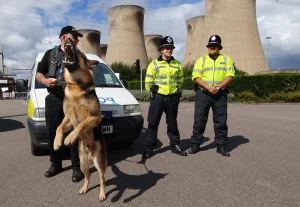
Tight security around Drax power station, where activists were gathering for a “Camp for Climate Action” in August 2006. Photo by John Giles/PA Images via Getty Images
Kennedy may have sold out his comrades, but when police began hitting a woman on the legs with their batons, he apparently intervened. Not knowing he was an undercover officer, five officers swarmed him. “They had batons and pummelled my head. They punched me. One officer repeatedly stamped on my back,” he later told the Daily Mail.
All of Kennedy’s recollections should be viewed with some skepticism, according to the tribunal. It deemed him a “highly unreliable narrator” and, given his long history of deception, “we do not consider we can put any weight on statements and comments he has made.”
Within the movement, though, Kennedy now had a proven track record as an organizer and the battle scars to prove it.
But as the months and years went on, some climate activists still had trouble putting their faith in him. It was the day-to-day things that made him seem out of place. His seemingly endless supply of cash was suspect. Kennedy ate meat and kind of talked like a bro. “I never trusted him because he was macho as fuck,” Jay Jordan, a climate organizer who worked occasionally with Kennedy during this era, told VICE World News.
Kennedy’s political views seemed unsophisticated. “He was not the most intellectual guy in the bunch, and when I say that, I mean he didn’t really grasp very well complicated political topics,” Kirkpatrick said. “So if we tried to get down to a serious discussion on climate change, he would kind of go, ‘Oh, that’s enough for me. The problems are clear; we need to do something.’”
The activists suppressed their doubts. Some of them were educated intellectuals who didn’t want to write him off just because he seemed working-class. And Kennedy was always eager to help out. Plus, he had a van. (What they didn’t know was that by driving people home after protests, he could gain information about where they lived.)
Crucially, after Kennedy and Wilson broke things off, Kennedy quickly got into another long-term relationship with a woman who goes in public by the pseudonym Lisa. Jordan believes these relationships were crucial for Kennedy’s undercover work. “If he hadn’t been with the women he was with… I don’t think he’d have been able to do the work he was doing,” Jordan said. “He totally used [them] as a way in and to gain trust.”
By 2009, Kennedy was using that trust to work with a small group of climate activists on a top-secret mission. Their target was Ratcliffe-on-Soar, another massive coal-fired plant, this one south of Nottingham, the city where Kennedy had first begun his deployment. They figured if they could recruit dozens of activists from around the country, break into the facility, turn off the generator, and occupy the power station for a week, it would create a media spectacle that would embarrass the UK government and create public pressure to move the country off coal.
Police deal with climate change protesters at Ratcliffe-on-Soar power station in October 2009. Photo by David Jones/PA Images via Getty Images
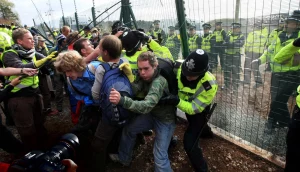
Police deal with climate change protesters at Ratcliffe-on-Soar power station in October 2009. Photo by David Jones/PA Images via Getty Images
Kennedy was involved almost from the start. He drove a few of the activists in the planning committee on a scouting mission around the plant. But they had no idea that Kennedy had been ordered by his superiors to prevent the protest from happening. A confidential document from the National Public Order Intelligence Unit cited in Undercover stated that if activists successfully shut down Ratcliffe-on-Soar, it could cause “severe economic loss to the United Kingdom and have an adverse impact on the public’s feeling of safety and security.”
Danny Chivers was one of dozens of people invited to take part in the direct action. The invitation was short on details. He was told to show up at a school in the suburbs of Nottingham, prepare to spend the night, and not bring his phone. “That sounds interesting,” Chivers thought. When he got to the school on April 12, 2009, organizers briefed the crowd on the plan to occupy the coal plant the following day and warned that anyone who participated would likely be arrested. They gave people until 3 a.m. to decide if they wanted to join.
Chivers debated what to do. “At this point I’d never been arrested at a protest,” he told VICE World News. “So it was like, ‘OK, am I genuinely ready for this?’”
Unbeknownst to the crowd, Kennedy was secretly recording the entire meeting with a police-issued wristwatch. Chivers was in his sleeping bag and still hadn’t made up his mind about whether he’d join the direct action when, shortly after midnight, police raided the school. “There was this loud banging on the door, and suddenly hundreds of police officers stormed the building,” he said.
A police officer stood in the middle of the room, according to an account of the event in Undercover. “You are all under arrest on suspicion of being involved in a conspiracy to commit aggravated trespass and/or criminal damage at a power industry facility,” the officer said. Altogether, 114 people were arrested.
The year before the Ratcliffe-on-Soar raid, in 2008, Kennedy travelled to New York City to spy on a meeting of anti-capitalists from the U.S. and Europe. Halpin, the U.S. climate organizer who now runs an internet privacy company, was one of the people there. He’d first met Kennedy a while back at a bar in the UK. “He struck me as not very bright,” Halpin told VICE World News. Halpin was a young, radical computer scientist working on a graduate degree who was involved with the Climate Camp movement. He had friends who were climate scientists, and he became convinced the global emergency would keep getting worse without intense pressure from civil society. “Nothing felt as important as the climate,” he said.
The meeting in New York was nothing special, according to Halpin, who is originally from the U.S. Activists debated protest techniques, talked about the ecological crisis, and complained about the lack of social spaces to organize. Halpin claimed that at one point Kennedy got bored and left the meeting to go drinking. “It was a bit of a pointless meeting,” Kennedy later acknowledged to Rolling Stone.
But after that trip to New York, Halpin began to feel targeted by police for his activism. Back in Europe, Halpin attended a meeting where activists strategized about how to influence the upcoming international climate negotiations being hosted in Copenhagen. Kennedy was also present. When Halpin returned to England, he got stopped at the border and interrogated as if he were a terrorist. “They forced me to give over my biometrics against my will,” he claimed.
Later that year, Halpin went to Copenhagen to join a demonstration pressuring leaders to adopt an aggressive climate deal. Without such a deal, they feared, developing countries would become increasingly vulnerable to floods, extreme weather, drought, famine, and resulting political instability.
But the protest didn’t have the impact Halpin had hoped for. Danish police showed up and arrested more than 230 people. “I was beaten,” Halpin said. “They broke my glasses.” Halpin said he was taken to a private jail cell. He was later told he was a suspected “terrorist,” but without evidence to charge him, Danish police let him go.
In the meantime, the Copenhagen negotiations ended in a stalemate between major world polluters. It was a “spectacular failure” in the eyes of some observers.
The experience shook Halpin. When he was later offered a job interview at MIT with Tim Berners-Lee, one of the inventors of the World Wide Web, Halpin figured it might be a good time to leave. But when he landed in the U.S., Halpin said police pulled him aside and questioned him for hours. They showed him a photo from a climate protest he’d been at that Kennedy had also attended. Later, he claimed, two FBI agents showed up in the middle of his interview with Berners-Lee. (Halpin’s name is listed in FBI documents from 2008 that were viewed by VICE World News.) He quickly found an attorney, who advised him to go back to Europe.
A judge-led inquiry about spy cops now underway in the UK includes Halpin’s name on a list of people targeted by undercover police. Set up in 2015 by former British Prime Minister Theresa May, this Undercover Policing Inquiry is considering decades worth of evidence about the UK’s covert police programs to make recommendations about how “undercover policing should be conducted in future.”
Around the time that Halpin was having run-ins with the FBI, Chivers, the activist who got arrested before the Ratcliffe-on-Soar protest, was also feeling uncertain about his future. After the arrests at the school, the authorities charged 26 protesters with conspiracy to commit trespass, an offence that could potentially result in three months in prison. Twenty of those activists were people who had decided before the raid they would be part of the power plant occupation. They intended to argue in court that their actions were warranted by the seriousness of the climate emergency, and eventually arranged to have NASA scientist and climate expert James Hansen speak in court on their behalf.
Chivers belonged to a smaller group of six who had a separate attorney and were planning to argue they hadn’t decided to join the action before police arrested them. “We were basically on trial just for thinking about it,” he said.
With many of the arrested activists out on bail, Kennedy and seven other activist friends decided to host a huge multi-day rager to celebrate their 40th birthdays. They formed a rock band called the 69ers. The plan was to perform cover songs such as “Anarchy in the UK” by the Sex Pistols for a drunken crowd out in a barn in a rural area of Herefordshire.
But before Kennedy was to go on stage, he received a text message from the National Public Order Intelligence Unit. “The operation is over,” it said, according to an activist whom VICE World News has agreed to identify as “Jack” due to privacy concerns.
Kennedy reportedly finished the gig in a daze and went to bed early. Over the coming days and weeks, he started acting paranoid and jumpy, Jack told VICE World News. It seemed like Kennedy was on the verge of a nervous breakdown.
Kennedy’s friends were legitimately concerned. They didn’t know faking a downward mental spiral and abruptly disappearing were standard training for undercover officers ending their deployment—although in Kennedy’s case, some of the anguish may have been genuine, Jack and other activists later speculated. Not long after the birthday party, Kennedy told people he wasn’t feeling well. He said he was going to visit his brother in the U.S. And then he left.
Kennedy’s exit strategy seemed to be going exactly to plan. But several months later, he suddenly reappeared back in England. His old friends were confused about how everything had gone down but happy he’d returned. Nobody knew it at the time, but Kennedy appears to have traded the police for a new employer.
Around this time, he says he began working as a consultant for a corporate intelligence agency called Global Open. One of its clients was E.ON, the operator of the Ratcliffe-on-Soar power station. The Guardian and Daily Mail reported on documents showing that Kennedy set up a company with the same address as a former Global Open director. However, a Global Open representative told the Guardian it had never employed the former cop. And, the Daily Mail reported, “E.ON would not confirm or deny whether Kennedy worked for it.”
Before Kennedy’s police operation ended, he’d had to turn over all the fake documents that police had created for him. He no longer had a passport in the name of Mark Stone.
The details of what happened next were provided to VICE World News by Jack. His account also tracks what reporters have described in the book Undercover, as well as other media reporting. In the summer of 2010, Kennedy and his then-girlfriend Lisa went on vacation to Italy. One day while Kennedy was gone, Lisa began rifling around in their van’s glovebox for some sunglasses. She pulled out a passport that had Kennedy’s real name on it. It said he was a father. She found an iPhone and it contained emails addressed to “dad.”
When Kennedy returned, Lisa confronted him. “He absolutely broke down,” said Jack, who remains close friends with Lisa. Through sobs, Kennedy said he was using the name Stone even though his legal name was Kennedy to throw off inquiries into his drug-dealing past. He said the kid was actually the son of his former drug-running partner and that when the partner had died Kennedy had adopted the kid as his own.
Lisa wanted to believe him. They’d been together for years at that point. Kennedy had gone to her dad’s funeral. But something didn’t sit right with her.
Several months later, Lisa confided her doubts in Jack, who was an amateur expert in genealogical research. He couldn’t find any evidence of a Mark Stone, but he did find public records of a Mark Kennedy with a wife and two children. After further digging, he located a birth certificate for one of Kennedy’s kids. It listed the dad’s occupation as “police officer.” “My heart was just racing,” Jack said. They got another friend in Dublin to pull up records on Kennedy’s wife and they found a phone number. Lisa dialled the number and Kennedy answered the phone. “You need to come here and explain the truth,” Lisa said, according to the friend.
When Kennedy arrived at a house in Nottingham, six people were waiting for him, including Lisa and Jack. It was past 1 a.m., and they all sat in the living room. Kennedy fessed up to having a wife and children but kept telling improbable lies about his past. Finally, one person in the room asked him straight-up: “When did you join the police?” Kennedy looked up at the ceiling and exhaled deeply, according to Jack. Only then did Kennedy admit he was a cop.
The activists made their discovery public on IndyMedia UK, a platform where people could post about “important social and political issues” that weren’t being covered in the mainstream media. “Mark ‘Stone/Kennedy’ exposed as undercover police officer,” their post read. “A face-to-face confession has confirmed this.” Initially nobody outside their circles paid much attention. But the legal implications for activists facing jail time in the Ratcliffe-on-Soar trial were immediately obvious. The prosecution hadn’t made it known in court that the arrests were due to an undercover officer. If Kennedy’s wristwatch recording of the raid was made public, it would show that Chivers and other activists had never officially consented to taking part in the coal-plant occupation.
“The case against us collapsed,” Chivers said. “We were able to get it overturned.”
That’s when the story of Kennedy exploded. The Guardian ran a story entitled “Undercover officer spied on green activists.” Kennedy hired a celebrity publicist and did interviews with the Daily Mail, the BBC, and Rolling Stone. In those early stories, Kennedy portrayed himself as a tortured soul who’d fallen in love with people that he’d been assigned to spy on. “I do miss her so much,” Kennedy said of the person known as Lisa during a tearful interview with Channel 4. “Despite everything, you know, I still lied to her.”
But Kennedy’s former activist friends were not feeling particularly sympathetic. The news of his true identity came at a perilous time for the climate movement. The Copenhagen climate talks had ended in failure. Climate deniers were feeling emboldened after a hacker stole and made public over 1,000 emails from UK climate researchers, an event the deniers dubbed “Climategate” that falsely purported to show the researchers expressing doubts about climate science. In the U.S., a major bill to limit greenhouse gas emissions had collapsed.
On top of all that, many activists in the Climate Camp movement were burning out after years of organizing. They were getting older and dropping out. The Kennedy news, Chivers said, “was another gut punch.” It was “part of this great sucking-out of energy when we needed to stay strong,” he said.
Jordan agrees that learning about Kennedy’s betrayal frayed trust that had taken years to build. “The effect it has on the movement is it makes you doubt everything,” he said.
For Wilson, the news about Kennedy blew up her sense of identity. “The impact of that, the grief and the paranoia, and the sense of shame really paralysed me for a very, very long time,” she later said. Following further investigations from the Guardian about the National Public Order Intelligence Unit, other social justice and environmental activists began to come forward with stories about undercover police who had tricked them into relationships.
In December 2011, Wilson and seven other women launched legal action against the Metropolitan Police. “It is unacceptable that state agents can cultivate intimate and long-lasting relationships with political activists in order to gain so-called intelligence on those political movements,” they said.
While their legal case moved forward, Kennedy was searching for new jobs in the U.S. In 2011, he contacted Stratfor, which provides intelligence services for corporations. In an email later made public by WikiLeaks, Kennedy explained to Stratfor he has “an in-depth understanding of the trends and influences of activism on a domestic and international level, having infiltrated many groups throughout eight years of international deployment.”
“Very impressive undercover work,” one Stratfor analyst wrote in a separate email to a colleague that was also leaked. “He sure looks like a dirty hippy.” Stratfor didn’t respond to a media request from VICE World News about these emails.
Not long after, Kennedy updated his LinkedIn profile to say he was now a consultant for the Densus Group, a “boutique risk management company” that among other assignments has advised pipeline companies on how to deal with protests from Indigenous tribes and environmental groups. His profile currently says he lives in West Hollywood, California. The Densus Group didn’t reply to an inquiry from VICE World News asking if Kennedy works with the company currently or has ever worked for it.
Back in the UK, the Metropolitan Police issued an official apology to Wilson and other activists in 2015. “They were deceived fair and simple,” it read. But the apology claimed that Kennedy was a rogue officer and that his superiors never would have authorized him to sleep with activists as an intelligence-gathering tactic. Wilson thought that was bogus. In a 2018 Guardian article she said, “I want to know how high up the police hierarchy knowledge of the abuses went.”
Last September, after nearly 10 years of court battles, Kate Wilson won a tribunal case for breaches of her human rights. Photo by Stefan Rousseau/PA Images via Getty Images
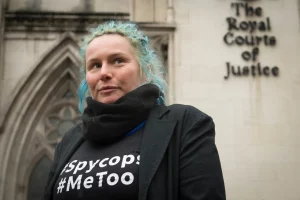
Last September, after nearly 10 years of court battles, Kate Wilson won a tribunal case for breaches of her human rights. Photo by Stefan Rousseau/PA Images via Getty Images
After nearly 10 years of court battles, a legal authority known as the Investigatory Powers Tribunal ruled last September that Wilson had suffered grievous human rights abuses at the hands of Kennedy and the police apparatus that supported him. “Senior officers either knew of the relationship, chose not to know of its existence, or were incompetent and negligent,” the ruling reads. But the tribunal couldn’t find evidence that the sexual relationships were a “deliberate tactic” of the National Public Order Intelligence Unit. “In our view, the true position is closer to being one of ‘Don’t ask, don’t tell.’”
It was still a monumental event. “I am totally reeling,” Wilson tweeted.
After decades of police secretly monitoring left-wing activists as if they were potential terrorists, the tribunal’s judgment could put pressure on law enforcement to actually respect the legitimate political expression of people who want to fix the planet and make society more equal. “It is to be hoped that these events of some years ago are no longer features of policing in this country,” the judgment reads. “We hope the [police] will learn lessons from these proceedings.”
No matter what the tribunal decides in terms of damages, it’s impossible to undo the harm Kennedy has already caused to Wilson and the global climate. The judgment in September noted that Wilson, now 41, “has been cut off from a significant part of her political activity” and that on the odd occasion when she’s attended large political events, “her anxiety has compelled her to leave.”
“Up until this autumn, I was channelling all that passion for social change into fighting the police over this issue,” Wilson said. “Now, the court case is over and I need to figure out what happens next.”
Halpin, too, says he was forced to “withdraw from all climate-related protest” due to fears about being tracked by police. What climate organizing he’s able to do must take place at a higher political level, through groups like Progressive International. In 2018, Halpin founded a company called Nym that uses blockchain technology to protect users from online surveillance. Nym was recently valued at around $270 million. “To this day I’m fighting a multi-jurisdictional court battle to get my name cleared, for Christ’s sake,” he said. “I still have trouble travelling and I run a multinational company.”
It pains him to think what climate activists in the UK and elsewhere could have achieved without Kennedy and other cops undermining them from within. “It was vastly demoralizing,” he said. “That probably cost the climate change movement years of organizing.”

